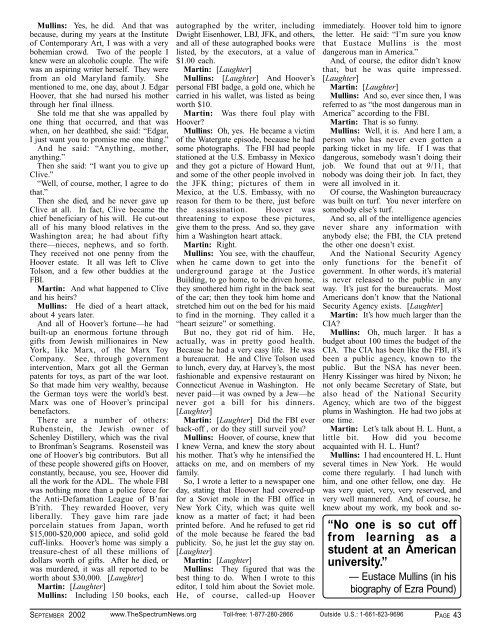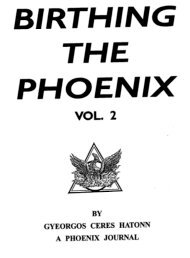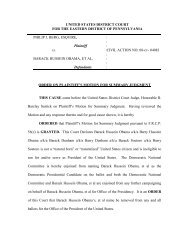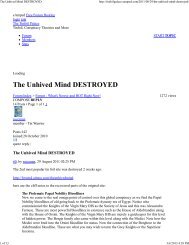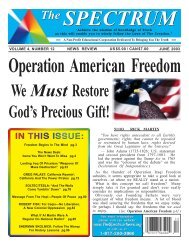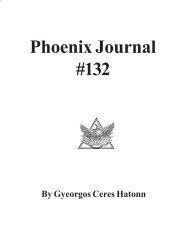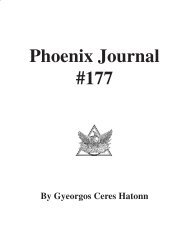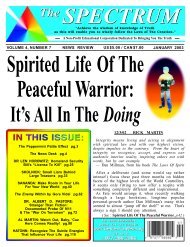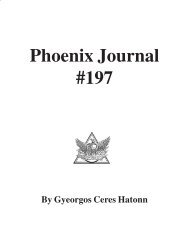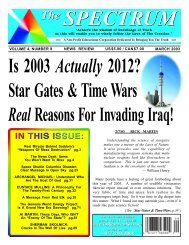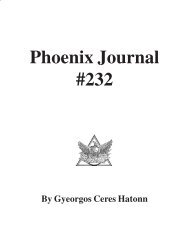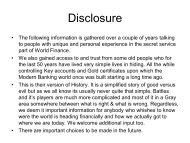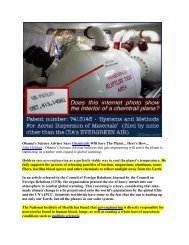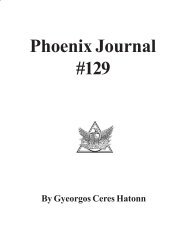Soldier Of Truth In A Lifelong Battle With Lies - Four Winds 10
Soldier Of Truth In A Lifelong Battle With Lies - Four Winds 10
Soldier Of Truth In A Lifelong Battle With Lies - Four Winds 10
You also want an ePaper? Increase the reach of your titles
YUMPU automatically turns print PDFs into web optimized ePapers that Google loves.
Mullins: Yes, he did. And that was<br />
because, during my years at the <strong>In</strong>stitute<br />
of Contemporary Art, I was with a very<br />
bohemian crowd. Two of the people I<br />
knew were an alcoholic couple. The wife<br />
was an aspiring writer herself. They were<br />
from an old Maryland family. She<br />
mentioned to me, one day, about J. Edgar<br />
Hoover, that she had nursed his mother<br />
through her final illness.<br />
She told me that she was appalled by<br />
one thing that occurred, and that was<br />
when, on her deathbed, she said: “Edgar,<br />
I just want you to promise me one thing.”<br />
And he said: “Anything, mother,<br />
anything.”<br />
Then she said: “I want you to give up<br />
Clive.”<br />
“Well, of course, mother, I agree to do<br />
that.”<br />
Then she died, and he never gave up<br />
Clive at all. <strong>In</strong> fact, Clive became the<br />
chief beneficiary of his will. He cut-out<br />
all of his many blood relatives in the<br />
Washington area; he had about fifty<br />
there—nieces, nephews, and so forth.<br />
They received not one penny from the<br />
Hoover estate. It all was left to Clive<br />
Tolson, and a few other buddies at the<br />
FBI.<br />
Martin: And what happened to Clive<br />
and his heirs?<br />
Mullins: He died of a heart attack,<br />
about 4 years later.<br />
And all of Hoover’s fortune—he had<br />
built-up an enormous fortune through<br />
gifts from Jewish millionaires in New<br />
York, like Marx, of the Marx Toy<br />
Company. See, through government<br />
intervention, Marx got all the German<br />
patents for toys, as part of the war loot.<br />
So that made him very wealthy, because<br />
the German toys were the world’s best.<br />
Marx was one of Hoover’s principal<br />
benefactors.<br />
There are a number of others:<br />
Rubenstein, the Jewish owner of<br />
Schenley Distillery, which was the rival<br />
to Bronfman’s Seagrams. Rosensteil was<br />
one of Hoover’s big contributors. But all<br />
of these people showered gifts on Hoover,<br />
constantly, because, you see, Hoover did<br />
all the work for the ADL. The whole FBI<br />
was nothing more than a police force for<br />
the Anti-Defamation League of B’nai<br />
B’rith. They rewarded Hoover, very<br />
liberally. They gave him rare jade<br />
porcelain statues from Japan, worth<br />
$15,000-$20,000 apiece, and solid gold<br />
cuff-links. Hoover’s home was simply a<br />
treasure-chest of all these millions of<br />
dollars worth of gifts. After he died, or<br />
was murdered, it was all reported to be<br />
worth about $30,000. [Laughter]<br />
Martin: [Laughter]<br />
Mullins: <strong>In</strong>cluding 150 books, each<br />
SEPTEMBER 2002<br />
autographed by the writer, including<br />
Dwight Eisenhower, LBJ, JFK, and others,<br />
and all of these autographed books were<br />
listed, by the executors, at a value of<br />
$1.00 each.<br />
Martin: [Laughter]<br />
Mullins: [Laughter] And Hoover’s<br />
personal FBI badge, a gold one, which he<br />
carried in his wallet, was listed as being<br />
worth $<strong>10</strong>.<br />
Martin: Was there foul play with<br />
Hoover?<br />
Mullins: Oh, yes. He became a victim<br />
of the Watergate episode, because he had<br />
some photographs. The FBI had people<br />
stationed at the U.S. Embassy in Mexico<br />
and they got a picture of Howard Hunt,<br />
and some of the other people involved in<br />
the JFK thing; pictures of them in<br />
Mexico, at the U.S. Embassy, with no<br />
reason for them to be there, just before<br />
the assassination. Hoover was<br />
threatening to expose these pictures,<br />
give them to the press. And so, they gave<br />
him a Washington heart attack.<br />
Martin: Right.<br />
Mullins: You see, with the chauffeur,<br />
when he came down to get into the<br />
underground garage at the Justice<br />
Building, to go home, to be driven home,<br />
they smothered him right in the back seat<br />
of the car; then they took him home and<br />
stretched him out on the bed for his maid<br />
to find in the morning. They called it a<br />
“heart seizure” or something.<br />
But no, they got rid of him. He,<br />
actually, was in pretty good health.<br />
Because he had a very easy life. He was<br />
a bureaucrat. He and Clive Tolson used<br />
to lunch, every day, at Harvey’s, the most<br />
fashionable and expensive restaurant on<br />
Connecticut Avenue in Washington. He<br />
never paid—it was owned by a Jew—he<br />
never got a bill for his dinners.<br />
[Laughter]<br />
Martin: [Laughter] Did the FBI ever<br />
back-off , or do they still surveil you?<br />
Mullins: Hoover, of course, knew that<br />
I knew Verna, and knew the story about<br />
his mother. That’s why he intensified the<br />
attacks on me, and on members of my<br />
family.<br />
So, I wrote a letter to a newspaper one<br />
day, stating that Hoover had covered-up<br />
for a Soviet mole in the FBI office in<br />
New York City, which was quite well<br />
know as a matter of fact; it had been<br />
printed before. And he refused to get rid<br />
of the mole because he feared the bad<br />
publicity. So, he just let the guy stay on.<br />
[Laughter]<br />
Martin: [Laughter]<br />
Mullins: They figured that was the<br />
best thing to do. When I wrote to this<br />
editor, I told him about the Soviet mole.<br />
He, of course, called-up Hoover<br />
immediately. Hoover told him to ignore<br />
the letter. He said: “I’m sure you know<br />
that Eustace Mullins is the most<br />
dangerous man in America.”<br />
And, of course, the editor didn’t know<br />
that, but he was quite impressed.<br />
[Laughter]<br />
Martin: [Laughter]<br />
Mullins: And so, ever since then, I was<br />
referred to as “the most dangerous man in<br />
America” according to the FBI.<br />
Martin: That is so funny.<br />
Mullins: Well, it is. And here I am, a<br />
person who has never even gotten a<br />
parking ticket in my life. If I was that<br />
dangerous, somebody wasn’t doing their<br />
job. We found that out at 9/11, that<br />
nobody was doing their job. <strong>In</strong> fact, they<br />
were all involved in it.<br />
<strong>Of</strong> course, the Washington bureaucracy<br />
was built on turf. You never interfere on<br />
somebody else’s turf.<br />
And so, all of the intelligence agencies<br />
never share any information with<br />
anybody else; the FBI, the CIA pretend<br />
the other one doesn’t exist.<br />
And the National Security Agency<br />
only functions for the benefit of<br />
government. <strong>In</strong> other words, it’s material<br />
is never released to the public in any<br />
way. It’s just for the bureaucrats. Most<br />
Americans don’t know that the National<br />
Security Agency exists. [Laughter]<br />
Martin: It’s how much larger than the<br />
CIA?<br />
Mullins: Oh, much larger. It has a<br />
budget about <strong>10</strong>0 times the budget of the<br />
CIA. The CIA has been like the FBI, it’s<br />
been a public agency, known to the<br />
public. But the NSA has never been.<br />
Henry Kissinger was hired by Nixon; he<br />
not only became Secretary of State, but<br />
also head of the National Security<br />
Agency, which are two of the biggest<br />
plums in Washington. He had two jobs at<br />
one time.<br />
Martin: Let’s talk about H. L. Hunt, a<br />
little bit. How did you become<br />
acquainted with H. L. Hunt?<br />
Mullins: I had encountered H. L. Hunt<br />
several times in New York. He would<br />
come there regularly. I had lunch with<br />
him, and one other fellow, one day. He<br />
was very quiet, very, very reserved, and<br />
very well mannered. And, of course, he<br />
knew about my work, my book and so-<br />
“No one is so cut off<br />
from learning as a<br />
student at an American<br />
university.”<br />
— Eustace Mullins (in his<br />
biography of Ezra Pound)<br />
www.TheSpectrumNews.org Toll-free: 1-877-280-2866 Outside U.S.: 1-661-823-9696<br />
PAGE 43


